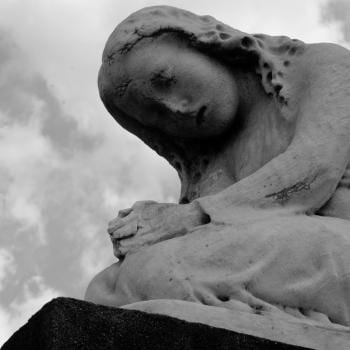Stepping Heavenward, chapter VI and VII
My readers will be pleased to hear that I have finally begun to find the theological discussions in this book boring. That means I will be covering them much more briefly, and will move more quickly through the book, and on to more interesting topics. I promise!
It’s January, and Katy is 20. We open with the Susan Green episode. Susan, as you may remember, was one of the poor people Katy visited with her mother in the last section of the book. Word comes that Susan “had had a dreadful fall” and is “half killed.” Katy volunteered to go in her mother’s place because her mother had “one of her worst colds” and was not feeling well.
Not that Katy particularly wanted to go.
“Do you think it is my duty to run after such horrid old women ?” I asked mother, at last.
“I think, dear, you must make your own duties, she said kindly. “I dare say that at your age I should have made a great deal out of my personal repugnance to such a woman as Susan, and very little out of her sufferings.”
I believe I am the most fastidious creature in the world. Sick-rooms with their intolerable smells of camphor, and vinegar and mustard, their gloom and their whines and their groans, actually make me shudder.
It occurs to Katy, however, that it was just these feelings that made Charley avoid her when she was sick, which she did not like at all. So she resolves to go anyway. She arrives just before the doctor does. The doctor performed an examination, and then takes Katy aside and tells her that Susan is going to die. Not good! The doctor asks who is going to stay the night with Susan, and Katy offers.
He took leave, and I went back to the bedside. I saw there no longer a snuffy, repulsive old woman, but a human being about to make that mysterious journey a far country whence there is no return. Oh, how I wished mother were there!
Katy tries to figure out how to break this news to Susan, because the doctor does not do so. She asks if Susan would like to see Dr. Cabot, but Susan does not take the hint.
“What were you and the doctor whispering about?” she suddenly burst out.
“He asked me, for one thing, if you had any friends that could be sent for.”
“I’ve been my own best friend,” she returned. “Who’d have raked and scraped and hoarded and counted for Susan Green if I hadn’t ha’ done it? I’ve got enough to make me comfortable as long as I live, and when I lie on my dying bed.”
“But you can’t carry it with you,” I said. This highly original remark was all I had courage to utter.
“I wish I could,” she cried. “I suppose you think I talk awful. They say you are getting most to be as much of a saint as your ma.”
Katy still does not know how to tell Susan what the doctor said, but Susan can see how oddly Katy is acting.
My tone must have said more than my words did for she caught me by the wrist and held me fast.
“He didn’t say nothing about my-about it being dangerous? I ain’t dangerous, am I?” I felt ready to sink.
“Oh Susan!” I gasped out; “you haven’t any time to lose. You’re going, you’re going!”
Susan declares that that “beats all my calculations” and that she had plans to live “ever so many years.” Susan declares herself not ready to die. When Katy tells Susan to “pray to God to have mercy” Susan declares she doesn’t know how to pray, and tells Katy to pray “might and main.”
And I did; she holding my wrist tightly in hard hand. All at once I felt her hold relax. After that the next thing I knew I was lying on the and somebody was dashing water in my face.
I’m honestly not sure what happened. Prentiss says the nurse came in to find Katy “fallen” by the side of the bed and had been trying to “revive” her. Did she faint? If she’d simply fallen asleep, it shouldn’t take water to wake her up. Either way, Susan is gone.
The nurse was closing Susan’s eyes in a professional way, and performing other little services of the sort. The room wore an air of perfect desolation.
Katy learns afterwards that Susan bequeathed her savings to whoever uttered the last prayer in her presence, which means Katy. Katy declares she does not want the money, and gives it all to Dr. Cabot, for him to use to help the poor (why Katy’s mother could not disperse it herself, given all of Katy’s mother’s work with the poor, I do not know.)
Katy writes as follows:
I have learned one thing by yesterday’s experience that is worth knowing. It is this: duty looks more repelling at a distance than when fairly faced and met.
That actually feels right to me.
So. Katy had a moving experience that has made her think about her approach to life. But she’s still Katy, which means she’s still prone to ups and downs.
Dr. Cabot sends Katy a really really really long letter that leaves me wondering whether New England ministers frequently wrote pages-long letters to 20-year-old parishioners in the 1830s. Was this a thing? How big is Dr. Cabot’s congregation? Big enough for Katy to have a dozen Sunday school students, and for that to be only one of many Sunday school classes at the church.
It’s an extremely boring letter. Dr. Cabot urges Katy to stop constantly assign herself whether or not she actually loves Jesus. “Life is too precious to spend in a tread-mill,” he tells her. He tells her that if she finds herself revolting at God’s will, she should go to him and cry out to him until she is able to say “not my will but Thine be done.” The only bit of the whole letter I’m going to quote is this:
“In reading the Bible I advise you to choose detached passages, or even one verse a day, rather whole chapters. Study every word, ponder and pray over it till you have got out of it all the truth it contains.
This is interesting. I always saw this approach as lazy, when I was Katy’s age. I tended to read three chapters of the Bible every morning. Reading just an individual verse and meditating on it seemed like a way to get out of having to do the hard work. It’s interesting to see it promoted in the 1830s.
Anyway! So much for Dr. Cabot’s very long letter!
Katy’s spiraling.
MARCH, 30.-Yes, I have prayed, and He has heard me. I see that I have no right to live for myself, and that I must live for. Him. I have given myself to Him as I never did before, and have entered, as it were, a new world.
Ay, but what does this mean?
Mother asked me last evening to sing and play to her. I was embarrassed to know how to excuse myself without telling her my real reason for declining. But somehow she got it out of me.
“One need not be fanatical in order to be religious,” she said.
“Is it fanatical to give up all for God?” I asked.
Ope.
So yes, Katy has given up music and drawing entirely. She is resolved. Except, of course, that it can’t last. Resolutions like that generally don’t.
APRIL 12.-Dr. Cabot’s letter has lost all its power over me. A stone has more feeling than I. I don’t love to pray. I am sick and tired of this dreadful struggle after holiness; good books are all alike, flat and meaningless. But I must have something to absorb and carry me away, and I have come back to my music and my drawing with new zest. Mother was right in warning me against giving them up. Maria Kelley is teaching me to paint in oil-colors, and says I have a natural gift for it.
Katy, Katy, Katy.
Many readers have commented that Katy has been kept in a child-like state. Her only responsibility is cleaning her room and straightening the parlor. Otherwise, she spends her time singing and drawing, or else visiting poor people with her mother or teaching a Sunday school class. And that’s it. Is it any wonder she’s constantly up and down? (Barring, of course, the possibility that she has a mental health condition, which could also explain this constant spiraling.)
APRIL 13. Mother asked me to go to church with her last evening, and I said I did not want to go.
Katy’s mother is not impressed.
“You speak of going back to your music as if that implied going away from God. You rush from one extreme to another. The only true way to live in this world, constituted just as we are, is to make all our employments subserve the one great end and aim of existence, namely, to glorify God and to enjoy Him forever. But in order to do this we must be wise task-masters, and not require of ourselves what we cannot possibly perform. Recreation we must have. Otherwise the strings of our soul, wound up to an unnatural tension, will break.”
She’s kind of right.
Katy’s mother finally does something she probably should have done ages ago. She sends Katy away.
New York, April 16. After all, mother has come off conqueror, and here I am at Aunty’s. After our quiet, plain little home, in our quiet little town, this seems like a new world. The house is large, but is as full as it can hold. Aunty has six children her own, and has adopted two. She says she was meant to imitate the old woman who lived in a shoe. She reminds me of mother, and yet she is very different; full of fun and energy; flying about the house as on wings, with a kind, bright word for everybody.
I like Aunty. Aunty makes Katy go out, taking her around the city, and Katy grows stronger as a result. Living with Aunty also keeps Katy busy—with eight children at home, many of them young, and a large house to run, there’s always something for Katy to do. Aunty’s family does not appear to face the relative privation Katy’s family has since her father died.
I hope I shall have just such a home. I mean this is the sort of home I should like if I ever married, which I never mean to do.
I’ve known people like Aunty, who have energy and drive that never seems to run out, along with a kind word for everyone and seemingly constant optimism and positivity.
Two weeks after Katy arrives in New York, Aunty’s baby takes ill. Scarlet fever. Once again, I am drawn to think of Little Women. In quick succession, all of the young children fall ill.
If they were my children, I should be in a perfect worry and flurry. Indeed, I am as it is. But Aunty is as bright and cheerful as ever. She flies from one to another, and keeps up their spirits with her own gayety.
I’ll tell you right now that none of Aunty’s children dies. Something else happens as a result of having scarlet fever in the house, though.
MAY 1.- The doctor says the children are doing as well as, could be expected. He made a short visit this .morning, as it is Sunday. If I had ever seen him before I should say I had some unpleasant association with him. I wonder Aunty employs such a great clumsy man. But she says he is good, and very skillful. I wish I did not take such violent likes and dislikes to people. I want my religion to change me in every respect.
MAY 2.-Oh, I know now! This is the very who was so rude at Sunday-school, and afterwards made such a nice address to the children. Well he may know how to speak in public, but I am sure he doesn’t in private. I never knew such a shut-up man.
The whole rest of this section is filled with similar asides about the doctor.
MAY 4.-I have my hands as full as they can hold. The children have got so fond of me, and one or the other is in my lap nearly all the time. I sing to them, tell them stories, build block-houses, and relieve Aunty all I can. Dull and poky as the doctor is, I am not afraid of him, for he never notices anything I say or do, so while he is holding solemn consultations with Aunty in one corner, I can sing and talk all sorts of nonsense to my little pets in mine. What fearful black eyes he has, and what masses of black hair!
I mean. Okay?
Meanwhile, Katy declares herself perfectly and truly happy. “This busy life quite suits me, now I have got used to it,” she writes. Meanwhile, there is still scarlet fever in the home.
MAY 14-It is now two weeks since little Raymond was taken sick, and I have lived in the nursery all the time, though Aunty has tried to make me go out. Little Emma was taken down to-day, though she has been kept on the third floor all the time I feel dreadfully myself. But this hard, cold doctor of Aunty’s is so taken up with the children that he never so much as looks at me. I have been in a perfect shiver all day, but these merciless little folks call for stories as eagerly as ever. Well, let me be a comfort to them if I can! I hate selfishness more and more, and am shocked to see how selfish I have been.
Girl. Me thinks thou dost protest a lot.
Also, balance, Katy. You need balance.
MAY 15.-I was in a burning fever all night, and my head ached, and my throat was and is very sore. If knew I was going to die I would burn up this journal first. I would not have any one see it for the world.
This begs a question. Should we be reading Katy’s diary? Isn’t that an invasion? Sure, it’s fiction … but what was the purpose of adding this note? It just makes me uncomfortable!
Anyway. Katy really isn’t feeling well.
MAY 24.-Dr. Elliott asked me on Sunday morning a week ago if I still felt well. For answer I behaved like a goose, and burst out crying. Aunty; looked more anxious than I have seen her look yet, and reproached herself for having allowed me to be with the children.
Yeah see I’ve been wondering this myself. If Katy’s health is so very precarious, why wasn’t she quarantined away from the children the moment the baby took sick? Why has she been the one nursing them, amusing them, spending her whole time in the nursery with them? Had she had scarlet fever already? If she had, she would have immunities.
Anyway, Aunty and the doctor put Katy to bed and she falls right asleep and sleeps most of the day.
The doctor came to see me in the evening, and made a short, stiff little visit, gave me a powder, and said thought I should soon be better.
I had two such visits from him the next day, when I began to feel quite like myself again, and in spite of his grave; staid deportment, could not help letting my good spirits run away with me in a style that evidently shocked him. He says persons nursing scarlet fever often have such little attacks as mine; indeed every one of the servants have had a sore throat and headache.
I assume this must mean Katy had already had scarlet fever before. It surely must, because it sounds like they’re assuming she can’t actually have scarlet fever.
MAY 25.-This morning, just as the doctor shuffled in on his big feet, it came over me how ridiculously I must have looked the day I was taken sick, being walked off between Aunty and himself, crying like a baby.
At this, Katy bursts out laughing.
“I suppose this will be your last visit, Dr. Elliott,” I went on, “and I am glad of it. After the way I behaved the day I was taken sick, I have been ashamed to look you in the face. But I really felt dreadfully.”
He made no answer whatever. I don’t suppose he would speak a little flattering word by way of putting one in good humor with one’s self for the whole world!
The reason I’m quoting so much of this is to give you an idea of how often Katy mentions the doctor and makes odd comments about him—his big feet, his graveness, etc. And that all leads up to … well … what happens next.
Katy has now been in New York for a month and a half. It’s been one month since the baby first took ill. Just so we’re clear.
JUNE 1.-We are all as well as ever, but the doctor keeps some of the children still confined to the house for fear of bad consequences following the fever. He visits them twice a day for the same reason, or at least under that pretense, but I really believe he comes because he has got the habit of coming, and because he admires Aunty so much. She has a real affection for him, and is continually asking me if I don’t like this and that quality in him which I can’t see at all.
Eep.
JUNE 2.-After the children’s dinner to-day I took care of them while their nurse got hers and Aunty went to lie down, as she is all tired out. We were all full of life and fun, and some of the little ones wanted me to play a play of their own invention, which was to lie down on the floor, cover my face with a handkerchief, and make believe I was dead. They were to gather about me, and I was suddenly to come to life and jump up and try to catch them as they all ran scampering and screaming about.
Some parts of this book are so damn realistic. Yes, this is exactly how young children behave.
But it’s at that moment that the doctor—who is finally identified as Dr. Elliott—walks in. Katy is pissed off.
I should think you might have knocked, Dr. Elliott,” I said, with much displeasure.
“I ask your pardon; I knocked several times,” he returned. “I need hardly ask how my little patients are.”
“No,” I replied, still ruffled, arid making desperate efforts to get my hair into some sort of order. “They are as well as possible.”
I’m going to show you the rest of this bit in full, only because it is so … weird.
“I came a little earlier than usual to-day,” he went on, “because I am called to visit my uncle, Dr. Cabot, who is in a very critical state of health.”
“Dr. Cabot!” I repeated, bursting into tears.
Of course he’s Dr. Cabot’s nephew. How very convenient.
“Compose yourself, I entreat,” he said; “I hope that I may be able to relieve him. At all events–”
“At all events, if you let him die it will break my heart,” I cried passionately. “Don’t wait another moment; go this instant.”
“I cannot go this instant,” he replied. “The boat does not leave until four o’clock. And if I may be allowed, as a physician, to say one word, that my brief acquaintance hardly justifies, I do wish to warn you that unless you acquire more self-control-”
“Oh, I know that I have a quick temper, and that I spoke very rudely to you just now,” I interrupted, not a little startled by the seriousness of his manner.
“I did not refer to your temper,” he said. “I meant your whole passionate nature. Your vehement loves and hates, your ecstasies and your despondencies; your disposition to throw yourself headlong into whatever interests you.”
“I would rather have too little self-control,” I retorted, resentfully, “than to be as cold as a stone, and as hard as a rock, and as silent as the grave, like some people I know.”
His countenance fell; he looked disappointed, even pained.
“I shall probably see your mother,” he said, turning to go; “your aunt wishes me to call on her; have you any message?”
“No,” I said.
Another pained, disappointed look made me begin to recollect myself. I was sorry, oh! so sorry, for my anger and rudeness. I ran after him, into the hall, my eyes full of tears, holding out both hands, which he took in both his.
“Don’t go until you have forgiven me for being so angry!” I cried. “Indeed, Dr. Elliott, though you not be able to believe it, I am trying to do right all the time!”
“I do believe it,” he said earnestly.
“Then tell me that you forgive me!”
“If I once begin, I shall be tempted to tell something else,” he said, looking me through and through with those great dusky eyes. “And I will tell it,” he went on, his grasp on my hands growing firmer-“‘It is easy to forgive when one loves.” I pulled my hands away, and burst out crying again.
“Oh, Dr. Elliott this is dreadful!” I said. “You do not, you cannot love me! You are so much older than I am! So grave and silent! You are not in earnest?”
“I am only too much so,” he said, and went quietly out.
I went back to the nursery. The children rushed upon me, and insisted that I should “play die.” I let them pull me about as they pleased. I only wished I could play it in earnest.
Um yeah so that happened.
I need all of your analysis, my lovely readers. Take to the comment section and let me know what you think of Dr. Elliot. My beef with Dr. Elliot is with his need to critique Katy’s “passionate nature.” If he has a problem with her disposition, he should probably stay away from her.
It has been one month. The only context Dr. Elliot has seen Katy in is when he has come to tend to Aunty’s children—and Katy makes it clear he didn’t spend that time visiting with her. Based on just that, he tells her he is in love her? He hasn’t even talked to her mother. How was it wrong when Charlie hinted that he loved her before talking to her mother, but not when Dr. Elliot does?
This timeline is ridiculous.
I have a Patreon! Please support my writing!















